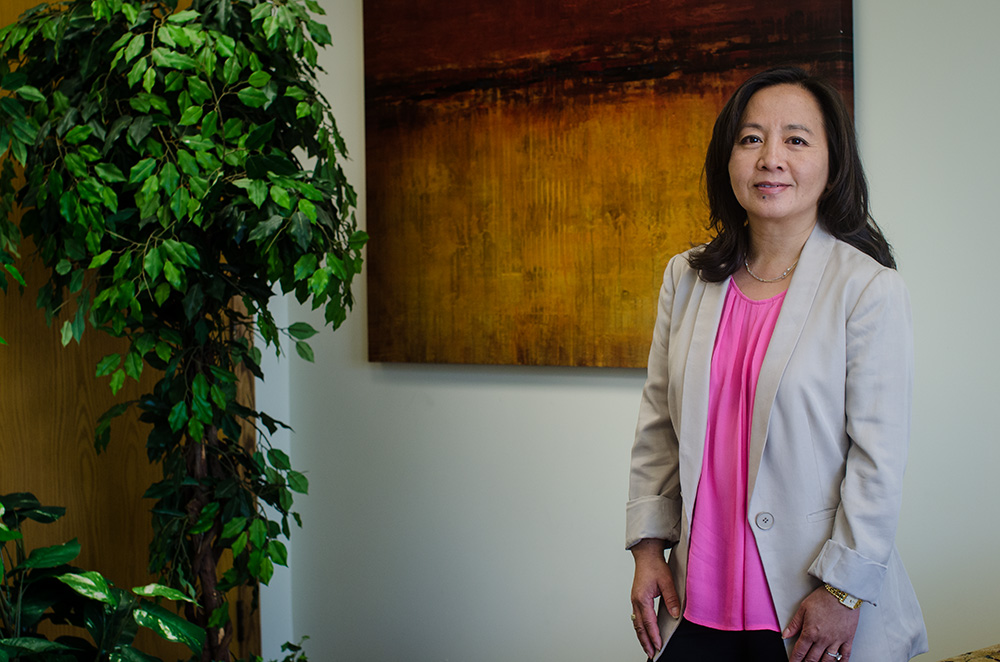The couples are young when they come to Pang Foua Yang Rhodes for premarital counseling. Most are Hmong; many are deciding whether to follow a traditional or more egalitarian model in their marriage.
Rhodes knows the divorce rate for their demographic group is very high. She works with couples to gain skills in three main areas—conflict resolution, healthy communication, and finding a “way of being in life—to be humble with each other.”
“It really cannot work if you want only your way,” Rhodes says. “You need to privilege your partner as much as your own self.”
Just seeking counseling is significant. “Nobody wants to learn skills they don’t believe in,” she notes.
Rhodes, who immigrated to Pella, Iowa, at the age of five with her Hmong family, credits her husband, Greg, a white man from southern California, as the source of her greatest inspiration. They met in a Christian fellowship at Brown University and soon fell in love.
“Our marriage revealed how everything is multicultural and multicontexual,” she says. “It made me more thoughtful about our own families and about families and culture in general.”
A legacy of changed lives
The Yang family was part of the first wave of Hmong immigration to the United States in the 1970s. Rhodes describes the timing of their arrival as perfect for her, a few weeks before starting kindergarten. A tomboy, she sat with the boys at lunch, loved watching football on TV, and aspired to be an Oakland Raider when she grew up.
“My parents really believed in education—especially my dad, who was a soldier and farmer,” she says. “They wanted all of us to pursue education, including my sister and me.”
Rhodes earned her bachelor’s degree in psychology. Then she and her husband moved to his home state of California, where she pursued a master’s in marriage and family therapy at Fuller Theological Seminary.
“We have a deal—we take turns working while the other goes to school,” Rhodes explains. When they met, her husband already had experience working with youth and wanted to become a youth pastor. But, while she began graduate school, he began teaching math, later working in computing, technology, and web development.
In a class during her master’s program Rhodes first identified Minnesota as a place to go for her Ph.D. One of the texts she read was Soul Searching by University of Minnesota family social science professor William Doherty.
“He argued that as a therapist you must see yourself as a moral agent, that therapy is not neutral, that we advocate for strong, healthy marriages,” remembers Rhodes. “I thought it was courageous of him, and I liked what he had to say.”
She quickly learned that Minnesota was a top school to pursue a doctorate in her field. It meant returning to the Midwest and settling in a metro area with one of the largest Hmong populations in the United States.
“It was time for me to come back to the Hmong community,” Rhodes says. “I wanted to work with Hmong couples and families, and to be part of my church community.”
At Minnesota, Rhodes got to study and work with the stellar faculty she sought. She especially remembers the impact of Doherty as well as Paul Rosenblatt, Zha Blong Xiong, Daniel Detzner, Pauline Boss, Liz Wieling, and the late James Maddock and Wayne Caron.
Since completing her Ph.D., Rhodes has worked as a therapist, joined the faculty of Argosy University, hosted a radio show for two years, and devoted herself to the Hmong community and an active life in her church. That means working on everything from women’s programs to retreat workshops.
Her husband, meanwhile, just completed his master of divinity degree at Bethel Seminary.
“And he would tell you he has learned a lot from being married to a marriage and family therapist,” Rhodes says with a laugh.
The Rhodes don’t have children of their own but have embraced a calling to focus together on the children of others.
“We want to leave a legacy of changed lives,” says Rhodes. “My mom and dad were both Christians, so I come from a faith heritage that is very strong. I watched both of them keep learning to live in faith, and the more they learned, the more they influenced us kids. I am all about empowering people to change and then to become agents of change—in lives including their children’s and the next generations. I hope they forget who I was but don’t forget who they are.”
Read more about the Couple and Family Therapy program in the Department of Family Social Science.
Story by Gayla Marty | July 2013
